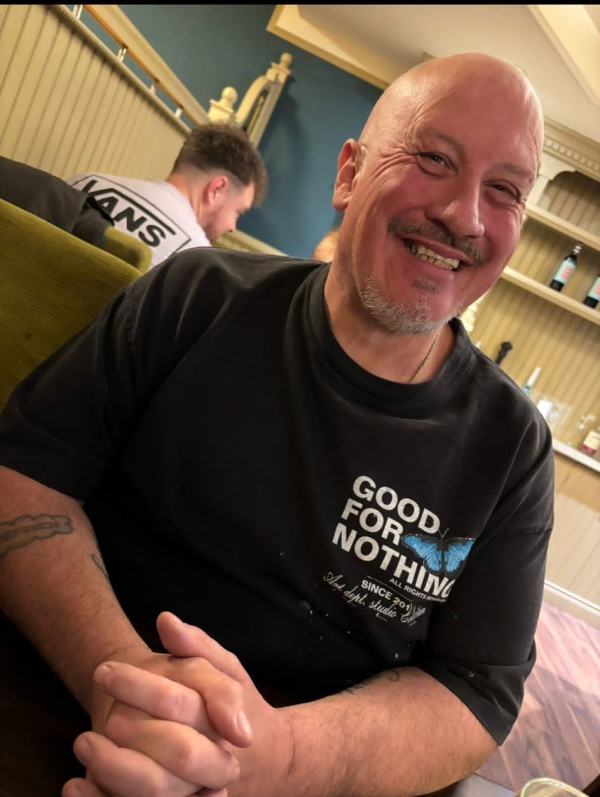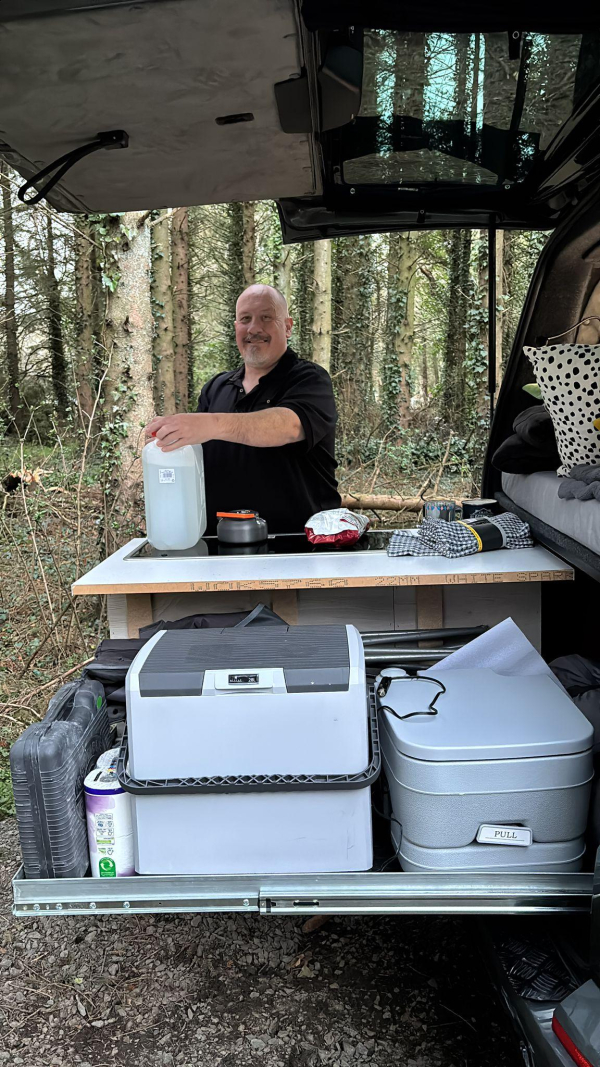
Stephen Monaghan, from Millisle in County Down, had a severe stroke at just 50 years old which sadly may have been preventable. Stephen is sharing his story in the run up to World Hypertension Day (17th May) in support of local health charity Northern Ireland Chest Heart & Stroke’s (NICHS) current blood pressure awareness campaign. He is speaking out about his experience as he wants to encourage others to get their blood pressure checked and highlight how important it is to take any medication as prescribed.
Stephen says; “Two years ago I was diagnosed with COVID-19 and was admitted to hospital. A nurse was checking my blood pressure and said she would do it again as it was showing up as extremely high. The reading came back as 240 over 120. High blood pressure is considered to be 140/90mmHg, but I didn’t really know anything about the numbers at that time. I didn’t realise how dangerous my numbers were, and I had no symptoms or warning signs.”
“I was put on medication, and it took a bit of work to get the dosage right, but it was managed for about a year. However, I then made the biggest mistake of my life and didn't take my medication for a couple of days. That led to me having a severe and life-changing stroke.”

Stephen recalls; “I was out with my son and some friends watching the Irish Bowls Final and that’s when the stroke struck. I had felt fine all day, we had just sat down to get something to eat, and I wanted to say, ‘What do you fancy?’ and the words just would not come out. I didn’t know what was happening. It was extremely frightening.”
“My son and friends realised something serious was happening although at first, they thought I was having a heart attack. The bowling club we were at had a defibrillator which I was then panicking they might use on me! They phoned an ambulance however, but ended up having to drive me to the Ulster Hospital because it was taking too long to come.”
“My son ran on into the hospital when we arrived and told the staff he thought I was having a stroke. The staff were brilliant, and I was brought straight in for treatment. I still couldn't talk, so I got all my medication information up on my phone and was motioning to it to try and give the staff some background. I was being taken for a CT scan, and they were talking to me about thrombolysis, which is a medicine to get rid of blood clots in the brain, and were explaining the potential side effects. I still had no speech, but I was pointing to my arm, to tell them that I wanted the injection. It was a terrifying experience, but that injection saved my life.”
Stephen was kept in hospital for a few days but was determined to get home and start his recovery journey, which was a long and hard road as he explains, “I had to learn to speak again and saw a speech therapist. It was very hard and frustrating at times, but I kept working at it. We all take things we do as second nature, like talking, for granted but when that is taken away from you it is devastating.”
“My balance isn’t as good as before the stroke and I’ve had a few falls. My short-term memory is also shot. You can’t understand what it is like unless it has happened to you, it changes every aspect of your life.”

“It can take me three times as long to do something now and it is very frustrating, but I don’t give up. I am self-employed and have a very motivated nature, and the medical professionals have agreed that has helped me be more determined in my recovery.”
“The mental impact has been massive too but thankfully I was put in touch with Northern Ireland Chest Heart & Stroke, and they have been a huge help in dealing with that.”
“One of the charity’s Care Coordinators, Dawn, visited me in the early days after my stroke and I availed of NICHS’s Family Support service. Dawn took the time to listen and understand my particular set of circumstances, so she could offer the personalised support I needed. She was able to give information and advice on living life after a stroke as well as details about the NICHS programmes I could attend.”
“I go to the Young Stroke Support group which is a Godsend for me. The other members understand what it’s like to have a stroke and the difficulties you face afterwards; they have all been through the same thing and totally get it. The group has made such a difference to my life. I have made true friends who look out for me, and I do the same for them.”
“I’m only in my early fifties; I want to keep moving on with my life, I’m doing better as time goes on, but I’ll never be the same again. For example, before my stroke I did a lot of public speaking as President of my bowling club and now I couldn't think of anything worse. It’s about learning to live with things as they are now, however. It can be hard to accept but I’m determined to keep moving forward.”
Talking about his support for NICHS’s current campaign Stephen says; “Thankfully, my blood pressure is under control now and I will always take my medication as prescribed.”
“I am supporting this campaign to highlight the dangers of unmedicated and undiagnosed high blood pressure. I hope sharing my story helps make people more aware and encourages them to act. I would urge people to get their blood pressure checked as there will be a lot of potential ticking time bombs out there. There are often no symptoms and if you don’t check it, you won’t know if your blood pressure is high. If you can, get a machine for checking it at home. I have one and can keep an eye on my numbers easily.”
“Also, to anyone on medication, please always take it as prescribed. Don’t take a chance, it’s not worth risking your life over.”
Fidelma Carter, Head of Public Health at Northern Ireland Chest Heart & Stroke, says; “We are very grateful to Stephen for sharing his story as it shows just how dangerous untreated high blood pressure, even if it is for a short period of time, can be.”
“As part of our campaign, we are urging anyone who is on medication for high blood pressure to take it as prescribed by their doctor or health professional and to never stop taking it without talking to them and getting their approval. The risks are just too great. If you are on blood pressure medication, you should also go for an annual check to review your medication.”
“Over 280,000 people, or around 1 in 5 of the adult population in Northern Ireland, are living with high blood pressure¹ but there is a significant number of people, around 120,000, who have high blood pressure and do not realise it. This gives us great cause for concern due to the fact one in two heart attacks and strokes are linked to the condition and it is something our current campaign aims to change.”
“Undetected high blood pressure is often known as ‘The Silent Killer’ due to the fact it rarely causes any physical symptoms or warning signs and is often only discovered after someone suffers a stroke or heart attack. The only way to know what your blood pressure is, and if it is high, is to have it measured and that is what we are urging the public to do this World Hypertension Day, and beyond.”
Fidelma continues; “A blood pressure check is simple and only takes a few minutes, but it really could help save your life. There are a number of ways you can get your blood pressure checked. You can make an appointment with your GP or visit your local pharmacy which may operate a blood pressure monitoring service. You could also buy a blood pressure machine for home monitoring.”
